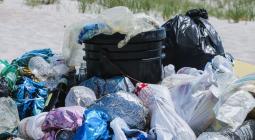Unilever to invest €1bn in green projects.

Unilever has set out new actions to fight climate change, and protect and regenerate nature, to preserve resources for future generations.
Unilever has announced a new set of sustainability commitments, pledging to end its contribution to deforestation, promote regenerative agriculture, transition to biodegradable ingredients and reach net-zero emissions for products by 2039 – all supported by a new €1 billion investment into the Climate and Nature Fund.
The international giant, which owns more than 400 brands including Comfort, Dove, Marmite and Sure, said that the €1bn fund was in response to the “scale and urgency of the climate crisis”. It will support a raft of initiatives, including landscape restoration, reforestation, carbon sequestration, wildlife protection and water preservation projects, the company said.
Alan Jope, Unilever CEO, said: “Climate change, nature degradation, biodiversity decline, water scarcity – all these issues are interconnected, and we must address them all simultaneously,” he said. “In doing so, we must also recognise that the climate crisis is not only an environmental emergency; it also has a terrible impact on lives and livelihoods.”
“We, therefore, have a responsibility to help tackle the crisis: as a business, and through direct action by our brands.”
Unilever has said to achieve this goal 11 years ahead of the 2050 Paris Agreement deadline, it will work jointly with its partners across its value chain, to collectively drive lower levels of greenhouse gas emissions.
In addition to this, the company has committed to achieving a deforestation-free supply chain by 2023. To do this, it will increase traceability and transparency by using emerging digital technologies – such as satellite monitoring, geolocation tracking and blockchain.
Marc Engel, Unilever Chief Supply Chain Officer, said: “If we want to have a healthy planet long into the future, we must also look after nature: forests, soil biodiversity and water ecosystems,” he said. “In most parts of the world, the economic and social inclusion of farmers and smallholders in sustainable agricultural production is the single most important driver of change for halting deforestation, restoring forests and helping regenerate nature. In the end, they are the stewards of the land.”
Unilever joins the ranks of firms pushing to reach the targets set during the Paris Agreement.
16 June 2020
Climate Action




